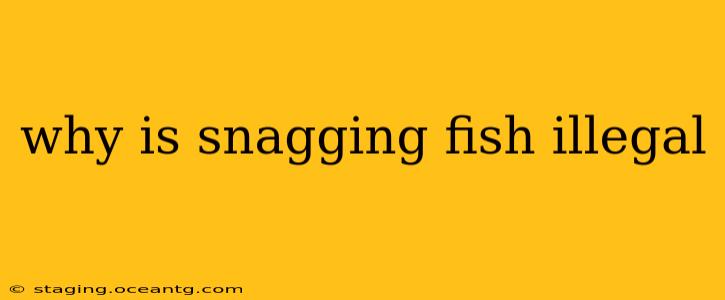Snagging fish, a method involving hooking a fish anywhere other than its mouth, is illegal in most places for a number of crucial reasons. This practice severely damages fish populations, disrupts the delicate ecosystem, and undermines the sustainability of recreational and commercial fishing. Let's delve deeper into the reasons behind this ban.
Why is snagging harmful to fish?
This question gets to the heart of the matter. Snagging inflicts significant harm on fish because it often results in:
-
High mortality rates: Fish hooked outside their mouths are far more likely to die. The hook can puncture vital organs, causing internal bleeding and infection. Even if the fish is released, the damage is often too severe for survival. Unlike a properly hooked fish, which usually fights with its mouth, snagged fish are injured and stressed, often leading to their death.
-
Severe injury: Even if a snagged fish survives, it often suffers significant injuries to its gills, eyes, or fins. These injuries can impair its ability to feed, swim, and evade predators, reducing its chances of long-term survival and impacting the overall health of the fish population.
What are the environmental impacts of snagging?
The consequences of snagging extend far beyond the individual fish. The practice also has detrimental effects on the environment:
-
Disruption of the ecosystem: Snagging indiscriminately targets fish of all sizes and species, potentially disrupting the natural balance of the aquatic ecosystem. Removal of large predatory fish can trigger unforeseen consequences in the food chain.
-
Damage to habitats: The forceful pulling of snagged fish can damage sensitive aquatic habitats like coral reefs or vegetation beds, further compromising the health of the ecosystem.
-
Spread of disease: Injured fish are more susceptible to disease. Snagging can contribute to the spread of diseases within fish populations, further weakening them.
How does snagging affect fair fishing practices?
Beyond the environmental concerns, snagging also undermines ethical and responsible fishing practices:
-
Unfair advantage: Snagging gives anglers an unfair advantage over those who practice ethical and sustainable fishing methods. It allows for the capture of a larger number of fish with less skill and effort, depleting fish stocks faster.
-
Undermining conservation efforts: Snagging directly contradicts efforts to manage and conserve fish populations through regulations, size limits, and catch limits. This makes the management of fisheries extremely difficult and compromises the sustainability of fishing stocks for future generations.
What are the penalties for snagging?
Penalties for snagging vary by location but typically involve hefty fines and potential license revocation. In some cases, more severe penalties might be imposed. It's crucial to understand and abide by the specific fishing regulations in your area to avoid legal consequences and protect our fisheries.
Is it ever legal to snag fish?
Generally speaking, no. There are very few, if any, exceptions to snagging laws. Some fisheries may have specific regulations for certain species or under very specific circumstances, but these are rare and almost always involve specific licensing and permits.
In conclusion, snagging's illegality stems from its destructive impact on fish populations, its detrimental effects on the environment, and its undermining of fair and sustainable fishing practices. Respecting fishing regulations is crucial for maintaining healthy fisheries and ensuring the enjoyment of this sport for generations to come.
